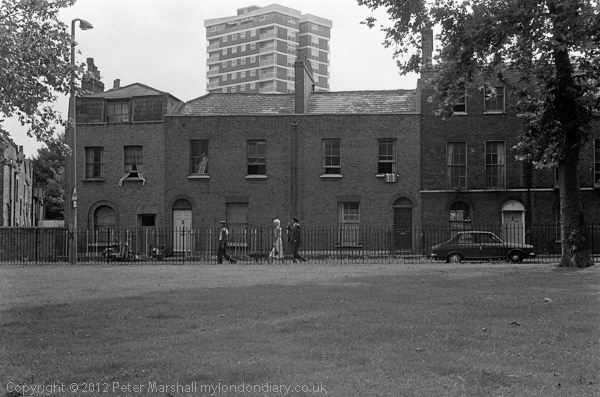

The author of this book Peter Marshall asserts his right to be identified as the author of all photographs in it in accordance with section 77 & 78 of the Copyright Design and Patents Act 1980
Quotations and translations from the work of Guy Debord are generally published with a ‘No Copyright’ declaration. No copyright is clamied for the new translation for this book of a well-known extract from his ‘Introduction à une critique de la géographie urbaine’. My thanks to Linda for her help with this, but any mistakes are mine.
First Edition 2013
ISBN 978-1-909363-08-3
London as it resonated with my dreams before and after making these images.
I wandered the streets following intuition and chance, either on my own or as a young father with one or other of my youthful assistants.
Take a walk with me through a London, much of which has disappeared or changed dramatically since I took these pictures.
For higher quality versions of some of theseimages you can buy the book or PDF London Dérives. The book contains 73 pictures selected from the larger group on this site. The images in both book and this web site are presented in roughly chronological order. As the afterword in the book makes clear, these pictures are only a very small fraction of my work on London in between 1975-83 and largely excludes images from a number of my major projects, including those on Docklands, London's Industrial History, the Lea Valley, the River Thames, London's canals and the people of London. Links to some of these are in my London Series index page. Buying the book or using my images in publications or by buying my prints supports my programme to make my images of London avialable on the web.
Please contact me by email at if you find any errors on the site, particularly incorrect links or captions - or if you can add information about the sites in the pictures.
One of the basic situationist practices is the dérive [literally:
“drifting”], a technique of rapid passage through varied
ambiances. Dérives involve playful-constructive behavior and awareness
of psychogeographical effects, and are thus quite different from the classic
notions of journey or stroll.
In a dérive one or more persons during a certain period drop their relations, their work and leisure activities, and all their other usual motives for movement and action, and let themselves be drawn by the attractions of the terrain and the encounters they find there. Chance is a less important factor in this activity than one might think: from a dérive point of view cities have psychogeographical contours, with constant currents, fixed points and vortices that strongly discourage entry into or exit from certain zones.
Theory of the Dérive
Guy Debord, 1956
The sudden change of mood in a street over only a few metres; the obvious
division of a city into clear-cut areas of mental climate; the steepest slope
- in no way connected to the contours - down which aimless strolling will
be led; the captivating or repellent nature of certain places, all this seems
to be neglected. Or at any rate never considered as depending on reasons that
can be brought to light by a thorough analysis and turned to advantage. People
are aware that there are gloomy districts and others that are pleasant. But
they usually convince themselves that the elegant streets give a sense of
satisfaction and that the poor ones depress, hardly any more nuanced than
that. In fact, the variety of possible combinations of moods, just like the
solution of chemical substances into an infinite number of mixtures, leads
to feelings as diverse and as complex as those brought on by any other type
of spectacle. And even the most basic objective scrutiny shows the impossibility
of formulating a qualitative or quantitative distinction between the influences
of the diverse built
environments in a city based solely on the period or style of architecture,
much less on the living conditions.
Introduction à une critique de la géographie urbaine
Guy Debord, 1955